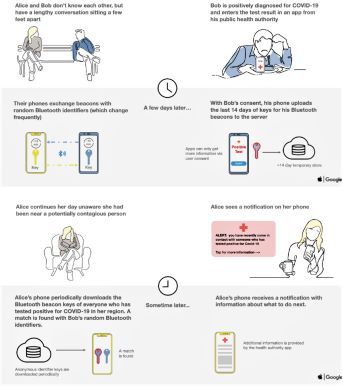Two University of California campuses will pilot the use of a smartphone technology to notify users if they have had a high-risk COVID-19 exposure that may result in infection. Importantly, privacy and security are central to the design of the technology, which does not collect location data from any device and never shares user identities.
The effort uses Google/Apple Exposure Notification (GAEN) technology on smartphones to supplement the essential work of human contact tracers and help further reduce the spread of SARS-CoV-2, the virus that causes COVID-19. A major goal of this pilot is to determine if using this smartphone technology can encourage users to respond to a high-risk exposure more quickly by self-isolating and receiving additional clinical resources, which are key to limiting the spread of COVID-19.
The limited pilot program will roll out incrementally at UC San Diego later this month. UC San Francisco plans to start using this technology a few weeks later for students, faculty and staff participating in onsite activities at select locations. These pilots will allow those who volunteer to use the technology to receive automatic smartphone notifications of a potential exposure to other enrolled users diagnosed with COVID-19, regardless of whether the users know each other.
As part of the privacy-first approach, users decide whether they want to share a verified positive test result with the app and determine whether they want to share that with other users. State and university epidemiologists will review the results of the pilot to determine how to optimize the smartphone-based technology and whether it should be rolled out more broadly.
“The opt-in pilot program will launch for students and employees on the campuses of UC San Diego and UC San Francisco. If the pilot is successful, it will set the foundation for the state to offer voluntary exposure notifications to all Californians using this free smartphone-based technology,” said Dr. Christopher Longhurst, chief information officer, UC San Diego Health. “The Google/Apple Exposure Notification (GAEN) Express tools offer a high-tech, privacy-preserving solution that automates the work of notification for you — without sharing who you are or providing unnecessary digital details that could compromise privacy.”
“It’s likely that we will need multiple approaches to exposure notification in order to meet the preferences and needs of individual Californians. This is a promising avenue to explore to supplement traditional methods,” said Dr. Carrie L. Byington, executive vice president of University of California Health and an infectious disease expert. “Fortunately, UC has the capacity to work on multiple fronts in the fight against COVID-19.”
The Google/Apple technology employs Bluetooth to communicate with other Bluetooth-enabled devices nearby, such as the smartphones of people who at the same time are traveling on a plane, standing with in line at a grocery store or sharing space inside a classroom or dormitory. When a person opts into using the Google/Apple notification system, the user’s phone broadcasts a random identification (ID) number to other phones in the area. When phones come within 6 feet of each another, they log each other’s IDs — without names or locations attached.

Credit: Google/Apple Exposure Notification FAQ, p. 4, https://covid19-static.cdn-apple.com/applications/covid19/current/stati…
If a person is diagnosed with COVID-19, they can voluntarily enter a keycode indicating they received a positive test result. This approach will generate an anonymous alert to other users based on proximity and length of exposure.
“By using Bluetooth technology, we can achieve notifications with strong privacy protections in place,” said Longhurst. “Your location information is never collected. User identities are not shared with anyone, including Apple and Google. And it is all voluntary, so users can opt out any time.”
Apple has made the technology available on the iOS 13.7 system update. Google will implement the system with an automatically generated application on Android 6.0 this month.
The pilot is supported by the UC San Diego Return to Learn initiative, UCSF and UCSF Health.
To learn more about GAEN, visit the information pages from Google and Apple.
About University of California Health
University of California Health (UCH) comprises five academic health centers, a community-based health system in Riverside and 20 health professional schools. All of UC’s hospitals are ranked among the best in California and its medical schools and health professional schools are nationally ranked in their respective areas. More information and news from University of California Health is available here.